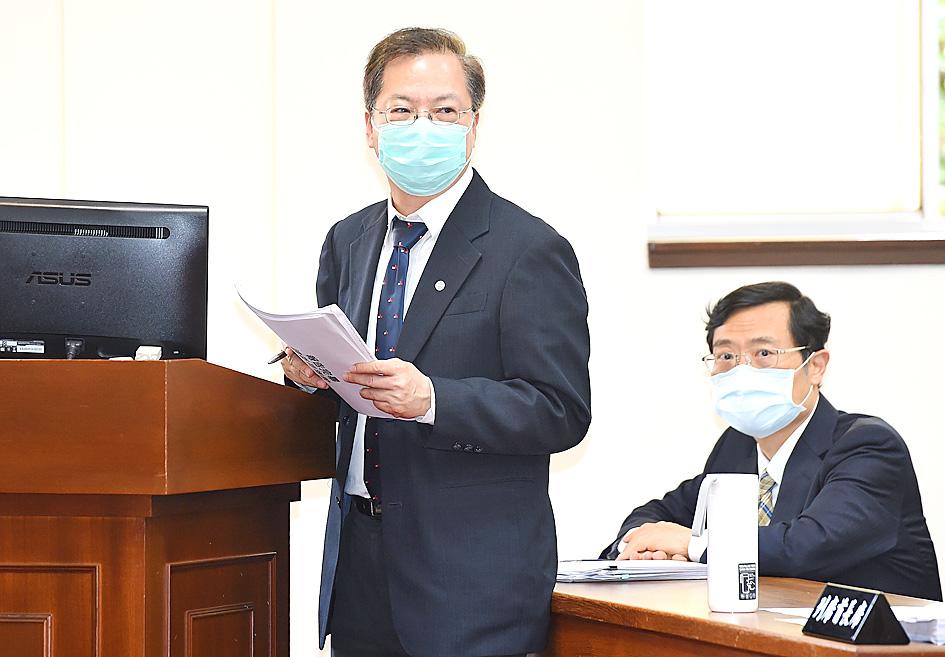The government is to review housing transaction data this week to determine if further action is necessary to cool the property market, National Development Council Minister Kung Ming-hsin (龔明鑫) said yesterday.
Kung made the remark while fielding questions from lawmakers at a meeting of the legislature’s Economics Committee in Taipei on whether unfavorable policy measures have achieved their intended effect.
“The government is to convene a cross-ministerial meeting later this week and review related data to arrive at a conclusion,” Kung said, adding that it takes time for the market to respond.

Photo: Liao Cheng-hui, Taipei Times
Housing transactions, prices and loans all continued an uptick during the January-to-March period, government data showed, fueling concern that more drastic measures might be needed.
Lawmakers have introduced bills to raise taxes to discourage investors from buying multiple homes, as critics have said that house-hoarding has contributed to rising property prices.
A closer look at the market is necessary to analyze the reasons behind the trend, Kung said, adding that media reports have cited data showing that real demand from young buyers is driving property transactions and the resulting price increases.
The economy is lending support after expanding 8.16 percent last quarter, making upward revisions for full-year growth inevitable, Kung said.
The Directorate-General of Budget, Accounting and Statistics is to update its projections on May 28 after forecasting a 4.64 percent increase for the year in February.
Kung declined to speculate if growth could reach 5.5 percent this year, but said that it could rise above the 5 percent mark.
He said that inflation risks are controllable and limited to some raw material prices, adding that education, fuel, rent and other costs remain stable.
Still, the government would monitor price increases on imported industrial and agricultural materials, he said.
Kung dismissed concerns that the economy is overheating, saying that a “red” signal in the government’s business climate monitor in February and March had to do with a low basis of comparison last year.

UNCERTAINTY: Innolux activated a stringent supply chain management mechanism, as it did during the COVID-19 pandemic, to ensure optimal inventory levels for customers Flat-panel display makers AUO Corp (友達) and Innolux Corp (群創) yesterday said that about 12 to 20 percent of their display business is at risk of potential US tariffs and that they would relocate production or shipment destinations to mitigate the levies’ effects. US tariffs would have a direct impact of US$200 million on AUO’s revenue, company chairman Paul Peng (彭雙浪) told reporters on the sidelines of the Touch Taiwan trade show in Taipei yesterday. That would make up about 12 percent of the company’s overall revenue. To cope with the tariff uncertainty, AUO plans to allocate its production to manufacturing facilities in

TAKING STOCK: A Taiwanese cookware firm in Vietnam urged customers to assess inventory or place orders early so shipments can reach the US while tariffs are paused Taiwanese businesses in Vietnam are exploring alternatives after the White House imposed a 46 percent import duty on Vietnamese goods, following US President Donald Trump’s announcement of “reciprocal” tariffs on the US’ trading partners. Lo Shih-liang (羅世良), chairman of Brico Industry Co (裕茂工業), a Taiwanese company that manufactures cast iron cookware and stove components in Vietnam, said that more than 40 percent of his business was tied to the US market, describing the constant US policy shifts as an emotional roller coaster. “I work during the day and stay up all night watching the news. I’ve been following US news until 3am

COLLABORATION: Given Taiwan’s key position in global supply chains, the US firm is discussing strategies with local partners and clients to deal with global uncertainties Advanced Micro Devices Inc (AMD) yesterday said it is meeting with local ecosystem partners, including Taiwan Semiconductor Manufacturing Co (TSMC, 台積電), to discuss strategies, including long-term manufacturing, to navigate uncertainties such as US tariffs, as Taiwan occupies an important position in global supply chains. AMD chief executive officer Lisa Su (蘇姿丰) told reporters that Taiwan is an important part of the chip designer’s ecosystem and she is discussing with partners and customers in Taiwan to forge strong collaborations on different areas during this critical period. AMD has just become the first artificial-intelligence (AI) server chip customer of TSMC to utilize its advanced

Six years ago, LVMH’s billionaire CEO Bernard Arnault and US President Donald Trump cut the blue ribbon on a factory in rural Texas that would make designer handbags for Louis Vuitton, one of the world’s best-known luxury brands. However, since the high-profile opening, the factory has faced a host of problems limiting production, 11 former Louis Vuitton employees said. The site has consistently ranked among the worst-performing for Louis Vuitton globally, “significantly” underperforming other facilities, said three former Louis Vuitton workers and a senior industry source, who cited internal rankings shared with staff. The plant’s problems — which have not